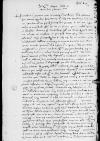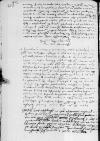Letter #1602
[Ioannes DANTISCUS] to [Sigismund I Jagiellon]Löbau (Lubawa), 1537-03-16
English register: Dantiscus submits to the king the Prussian councilors’ request concerning the Prussian assembly, which was to be held on May 8 in Malbork. The councilors suggest that the assembly venue be moved from Malbork to Toruń, shortening the distance that the royal commissioners expected at the assembly will have to travel. The councilors also propose that the date of the assembly be moved to May 24 or 25, so that all three provinces will be sure to receive the royal letters and mandates calling the gentry and the city representatives to the assembly. The councilors request that the king order the tax collectors to prepare detailed reports in order to make tax-collecting in the following year more efficient and better-ordered. The councilors are especially eager for the royal commissioners to identify, in accordance with the king’s statement to the Prussian gentry’s envoys at the Diet in Cracow, those responsible for the conflicts between the Prussian gentry and burghers, and to make sure they are properly punished. They also want the commissioners to deal with the matter of forceful abduction of a peasant of Maciej Pisiński, a nobleman from the Pomerania county, and his possessions, by Zygmunt Grudziński, resident of Krajno county within the Crown lands. The councilors hope that during the assembly, the royal commissioners will strive for a joint position and will not impair the councilors’ authority. In the postscript: During the sealing of the letter, a package containing Maurycy Ferber’s seal arrived, sent to Dantiscus for the purpose of confirming the Prussian Council’s demands contained in the above letter, and a statement that if Ferber were unable to attend the assembly because of his poor health, he would send two canons from the Warmia Chapter as a replacement.
Manuscript sources:
Auxiliary sources:
Prints:
| ||||||||||||||||||
Text & apparatus & commentary Plain text Text & commentary Text & apparatus
Serenissima Regia Maiestas et Domine, Domine clementissime. Humillimam perpetuae meae servitutis commendationem.
Post reditum
Praeterea, ut tandem Serenissima Maiestas Vestra serio exactoribus prioris contributionis mandaret, quod iam a Serenissima Maiestate factum est aliquotie{n}s, quo rationem
Consulunt item et humillime rogant, dominis ex
Petunt insuper a Serenissima Maiestate Vestra suppliciter, dignetur etiam eisdem ex
Petunt et hoc, quod potissimum est, Serenissima Maiestas Vestra dignetur venturis dominis dare in mandatis, ut se cum aliis hic Serenissimae Maiestatis Vestrae consiliariis in omnibus conforment
mutuoque de rebus tractandis habito consilio sic se gerant, ne Serenissimae Maiestatis Vestrae auctoritas in suis hic consiliariis elevetur, sed contra rebelles et novare omnia contendentes magis atque magis firmetur. Sic demum hic sperandum erit inoboedientes Serenissimae Maiestati Vestrae auctoresque seditionum in ordinem redigi posse , cunctaque in posterum tranquilliora futura. Haec quorundam
Datum
Postscript:
Postquam has absolvissem, in ipsa obsignatione misit ad me reverendissimus dominus
[1 ] We know that Dantiscus consulted
[2 ] When the Diet in Cracow was still in session, the king appointed the royal commissioners who
would attend the springtime Prussian assembly in 1537 –
[3 ] The springtime Prussian assembly usually started more than two weeks earlier – on St. Stanislaus’ Day (May 8)
[4 ] The Royal Prussian gentry’s legation to the 1536/37 Diet included: Chełmno district judge Jerzy Plemięcki and aldermen Fabian Wolski and Maciej Mgowski (cf. e.g. cf. MAŁŁEK 1976 p. 131 ⌊Małłek, 1976, p.131cf. MAŁŁEK 1976 p. 131 ⌋). Prussian gentry’s legation presented the king with gravamina containing about 20 objections, mainly against the Prussian Council and against the domination of the great cities (especially Gdańsk) over the region. The gravamina concerned economic matters (taxes, commerce, customs duty, measures and weights, minting of coins),legal issues (court procedure, court fine amounts, interpretation of the law on indigenousness, codification of Chełmno law, attacks by noblemen from neighboring voivodeships, accusations against Johann von Werden), administrative matters (the procedure of convoking general and particular assemblies, marking of territorial borders in Prussia), and defense (vetting) (print: cf. LENGNICH 1722 doc. No. 73, p. 173-183 ⌊Lengnich, doc. No. 73, p. 173-183cf. LENGNICH 1722 doc. No. 73, p. 173-183 ⌋)
[5 ] Maurycy Ferber’s representatives at the springtime Prussian assembly in 1537 were Warmia canons

